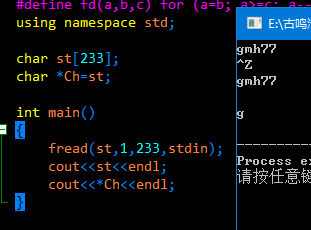前言
fread是吼东西
应某人要求(大概)科普一下
fread
#include <iostream>
#include <cstdlib>
#include <cstring>
#include <cstdio>
#define fo(a,b,c) for (a=b; a<=c; a++)
#define fd(a,b,c) for (a=b; a>=c; a--)
using namespace std;
char st[233];
char *Ch=st;
int main()
{
fread(st,1,233,stdin);
cout<<st<<endl;
cout<<*Ch<<endl;
}可以用文件输入,也可以直接输并在最后加Ctrl+Z

(下面的空行是因为读入了一个换行符)
fread基本格式:
fread(字符串,1,字符串大小,stdin);*Ch一开始指向的是st[0],之后可以不断*++Ch来往后跳
快速读入
#include <iostream>
#include <cstdlib>
#include <cstring>
#include <cstdio>
#define fo(a,b,c) for (a=b; a<=c; a++)
#define fd(a,b,c) for (a=b; a>=c; a--)
using namespace std;
char st[233];
char *Ch=st;
int getint()
{
int x=0;
while (*Ch<'0' || *Ch>'9') *++Ch;
while (*Ch>='0' && *Ch<='9') x=x*10+(*Ch-'0'),*++Ch;
return x;
}
int main()
{
fread(st,1,233,stdin);
cout<<getint()<<endl;
}fwrite
用处并不是很大
fwrite(字符串,1,字符串长度,stdout);快速输出
把数字转成字符串再反过来加进去(要加上空格/换行符)
#include <iostream>
#include <cstdlib>
#include <cstring>
#include <cstdio>
#define fo(a,b,c) for (a=b; a<=c; a++)
#define fd(a,b,c) for (a=b; a>=c; a--)
using namespace std;
char st[233];
int Len;
void putint(int x)
{
int a[233];
int i,len=0;
if (!x) len=1;
while (x)
{
a[++len]=x%10;
x/=10;
}
fd(i,len,1)
st[++Len]=a[i]+'0';
st[++Len]=' ';
}
int main()
{
Len=-1;
putint(1);
putint(2);
putint(233);
fwrite(st,1,Len,stdout);
}